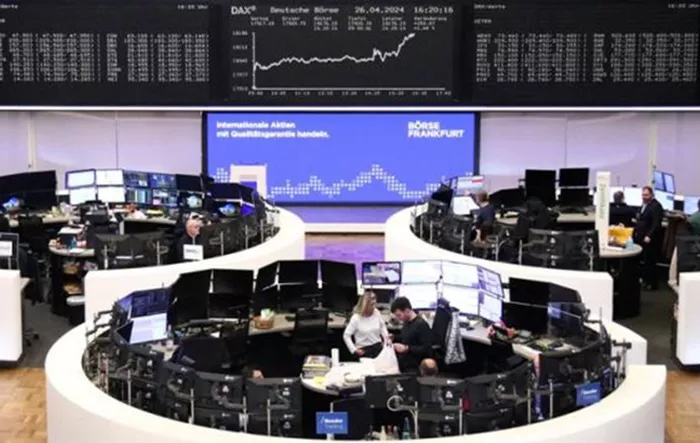European stock markets experienced a downturn on Wednesday as disappointing earnings from the luxury sector compounded worries about the profit outlook for the semiconductor industry. The Stoxx 600 index dropped 0.4%, driven by extended losses from chipmaking giant ASML Holding NV following its profit warning earlier this week.
Luxury Stocks Lead Market Decline
The decline in European equities was led by luxury companies such as LVMH and Salvatore Ferragamo SpA, both of which saw share prices fall as much as 7% after releasing lackluster financial updates. Weakness in the luxury sector added to the negative sentiment already impacting the market, following Tuesday’s slump in the semiconductor industry. U.S. equity futures, meanwhile, showed little change.
ASML’s Warning Ripples Across Semiconductor Industry
The semiconductor sector faced a major setback as ASML’s profit warning reverberated through the industry, contributing to a staggering $420 billion market value loss for a combined index of U.S.-traded and leading Asian chipmakers. Nvidia Corp., which had recently reached a record high, saw its shares fall nearly 5% on Tuesday, illustrating broader skepticism about the sustainability of the AI-driven market rally.
Analyst Comments on Economic Outlook
“The tech-led retreat triggered by the slump in chipmakers not only echoes earlier skepticism over the AI-driven rally but, more broadly, the slowdown in this economy-sensitive industry certainly does not bode well for the global economic outlook,” said Hebe Chen, an analyst at IG Markets, underscoring the sector’s impact on broader market sentiment.
UK Inflation Data Pushes Pound Lower
The British pound fell 0.6% to $1.2990, hitting its lowest level since August 20, following the release of weaker-than-expected inflation data. Consumer prices in the UK rose by just 1.7% year-on-year in September, falling short of economists’ forecasts and prompting increased speculation that the Bank of England might pursue more aggressive interest rate cuts.
U.S. Dollar and Treasury Yields Movement
Bloomberg’s dollar index climbed, reaching its highest level in two months, after former President Donald Trump defended his proposals to raise tariffs on foreign imports. At the same time, Atlanta Federal Reserve President Raphael Bostic indicated that while he expects the U.S. economy to slow, it will likely remain resilient. He also acknowledged that the downward trajectory of inflation may encounter some challenges. Treasury yields dipped slightly in response.
Asian Markets See Optimism in Property Stocks
In Asia, a Bloomberg gauge tracking Chinese property shares surged by as much as 8.3% ahead of a joint news conference on Thursday by government officials, including the housing minister and central bank representatives. Chinese markets have seen significant volatility since late September, following central bank stimulus measures that initially sparked optimism but have since failed to maintain momentum.
Short-Lived Boost for Property Stocks
Kenny Wen, head of investment strategy at KGI Asia Ltd., expressed skepticism about the lasting impact of any upcoming announcements, suggesting that “any announcements may only help property stocks for one or two days, but not the overall market.” He noted that investors are still awaiting a substantial fiscal stimulus package to boost economic growth.
Yen Steadies Ahead of Bank of Japan Comments
The yen traded at approximately 149 per dollar, as Bank of Japan Board Member Seiji Adachi emphasized the need for a gradual approach to raising the benchmark interest rate, reflecting ongoing caution within the Japanese central bank.
Oil Prices Rise Amid Middle East Tensions
Oil prices climbed on news that Israel would make its own decision regarding potential military actions against Iran, raising concerns about possible threats to energy infrastructure in the region. The oil market has seen significant fluctuations this month, influenced by geopolitical tensions in the Middle East and efforts by China to stimulate growth in its economy, the world’s largest oil importer.
Market Tied to Oil Volatility
Christoph Rieger, head of rates and credit research at Commerzbank AG, commented on the oil market’s impact on trading, stating, “It looks like dealers simply have their machines tied to oil futures these days. Whether it makes sense to adjust your long-term inflation view on the back of this is a different question.”
Conclusion
The combination of weak earnings in the luxury sector, semiconductor profit concerns, and fluctuating oil prices has created an atmosphere of uncertainty across global markets. Investors are navigating a complex landscape where economic data, central bank policies, and geopolitical tensions continue to drive volatility, leaving the outlook for equities and commodities clouded. As markets digest these developments, upcoming economic announcements and corporate earnings reports will be critical in shaping the direction of global financial markets.
Related Topics:

